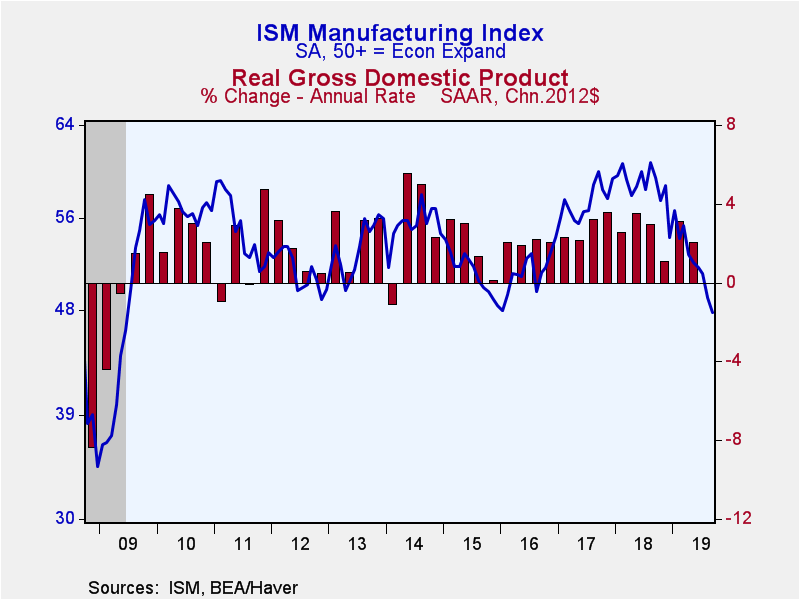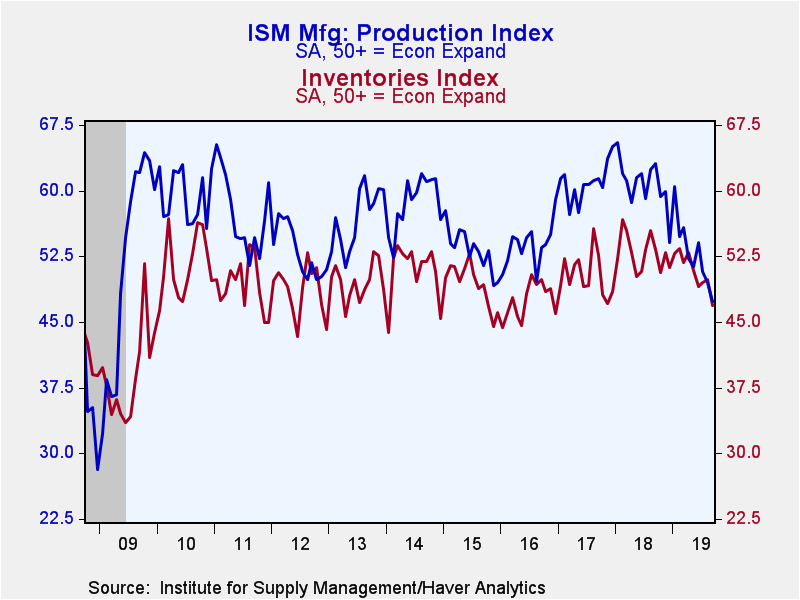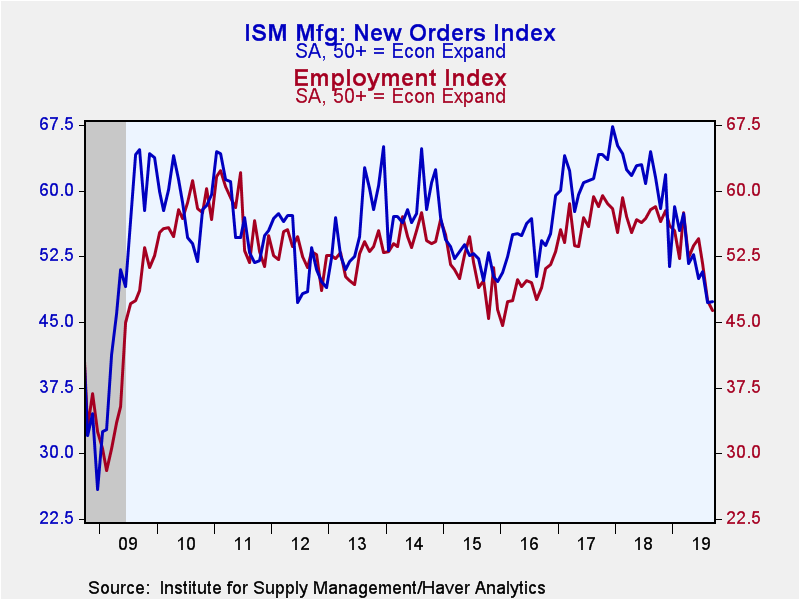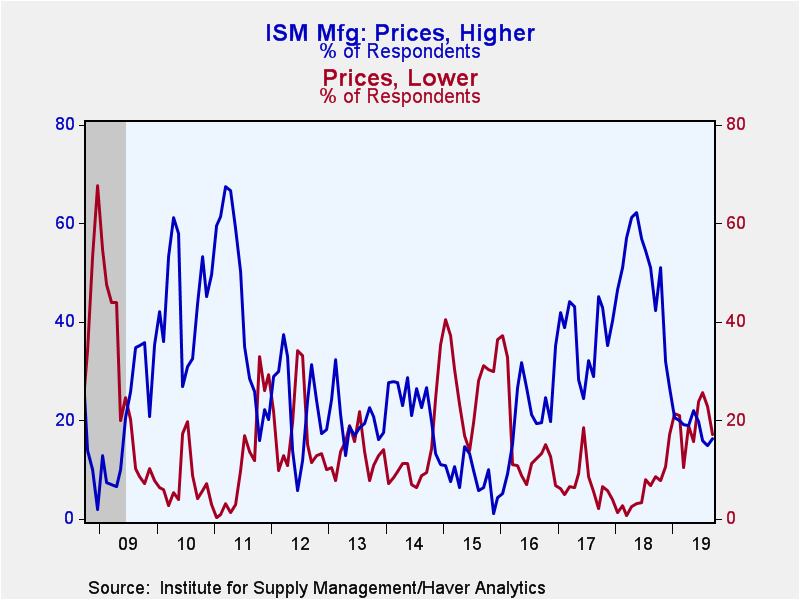 Global| Oct 01 2019
Global| Oct 01 2019ISM Factory Sector Index Declines to Ten-Year Low
by:Tom Moeller
|in:Economy in Brief
Summary
Weakness continues in the factory sector. The ISM manufacturing index fell to 47.8 during September from 49.1 in August. It was the lowest level since June 2009 which was the end of the last recession. The Action Economics Forecast [...]
Weakness continues in the factory sector. The ISM manufacturing index fell to 47.8 during September from 49.1 in August. It was the lowest level since June 2009 which was the end of the last recession. The Action Economics Forecast Survey anticipated a reading of 50.5. Since 2008, there has been a 72% correlation between the index level and quarterly growth in real GDP.
Most of the components of the ISM index deteriorated versus August. Production declined to 47.3, also the lowest level since the end of the last recession. Weakness developed as the inventory measure fell to 46.9, indicating the fourth consecutive month of inventory decumulation. The supplier deliveries suggested quicker product delivery speeds as it eased to 51.1, down from a high of 67.6 in June of 2018. Holding fairly steady m/m was the new orders figure at 47.3, though that was sharply below the high of 67.3 in December 2017.
Also moving lower was the employment index to 46.3, indicating a second consecutive month of payroll decline. A much fewer 15% (NSA) of respondents reported increased payrolls while a sharply higher 23% reported a decline. That compares to a low of six percent reporting a decline in August 2017. Since 2008, there has been an 84% correlation between the employment index and the m/m change in factory sector payrolls.
The prices paid series, which is not part of the composite index, improved slightly m/m to 49.7. That indicated price deflation for the sixth month this year. It remained below the high of 79.5 in May of 2018. A lessened 16% of respondents reported increased prices while 17% reported lower prices.
Amongst the other series in the ISM survey, the new export order index fell to 41.0, its lowest level since June 2009. The order backlog measure eased to 45.1, and continued to reflect a rapid decline in unfilled orders. The imports index edged higher m/m to 48.1, and remained near the lowest level since the middle of 2016.
The ISM figures are diffusion indexes where a reading above 50 indicates expansion. The figures from the Institute for Supply Management can be found in Haver's USECON database; further detail is found in the SURVEYS database. Commodity prices can be found in USECON as well as the CMDTY database. The expectations number is available in Haver's AS1REPNA database.
Are Workers Losing to Robots? from the Federal Reserve Bank of San Francisco is available here.
| ISM Mfg (SA) | Sep | Aug | Jul | Sep'18 | 2018 | 2017 | 2016 |
|---|---|---|---|---|---|---|---|
| Headline Index | 47.8 | 49.1 | 51.2 | 59.5 | 58.8 | 57.4 | 51.3 |
| New Orders | 47.3 | 47.2 | 50.8 | 61.5 | 61.4 | 62.2 | 54.5 |
| Production | 47.3 | 49.5 | 50.8 | 63.1 | 60.7 | 60.9 | 53.8 |
| Employment | 46.3 | 47.4 | 51.7 | 58.2 | 56.9 | 56.8 | 49.1 |
| Supplier Deliveries | 51.1 | 51.4 | 53.3 | 61.6 | 62.0 | 56.8 | 51.8 |
| Inventories | 46.9 | 49.9 | 49.5 | 53.3 | 52.9 | 50.4 | 47.5 |
| Prices Paid Index (NSA) | 49.7 | 46.0 | 45.1 | 66.9 | 71.7 | 65.0 | 53.1 |
Tom Moeller
AuthorMore in Author Profile »Prior to joining Haver Analytics in 2000, Mr. Moeller worked as the Economist at Chancellor Capital Management from 1985 to 1999. There, he developed comprehensive economic forecasts and interpreted economic data for equity and fixed income portfolio managers. Also at Chancellor, Mr. Moeller worked as an equity analyst and was responsible for researching and rating companies in the economically sensitive automobile and housing industries for investment in Chancellor’s equity portfolio. Prior to joining Chancellor, Mr. Moeller was an Economist at Citibank from 1979 to 1984. He also analyzed pricing behavior in the metals industry for the Council on Wage and Price Stability in Washington, D.C. In 1999, Mr. Moeller received the award for most accurate forecast from the Forecasters' Club of New York. From 1990 to 1992 he was President of the New York Association for Business Economists. Mr. Moeller earned an M.B.A. in Finance from Fordham University, where he graduated in 1987. He holds a Bachelor of Arts in Economics from George Washington University.
More Economy in Brief
 Global| Feb 05 2026
Global| Feb 05 2026Charts of the Week: Balanced Policy, Resilient Data and AI Narratives
by:Andrew Cates










